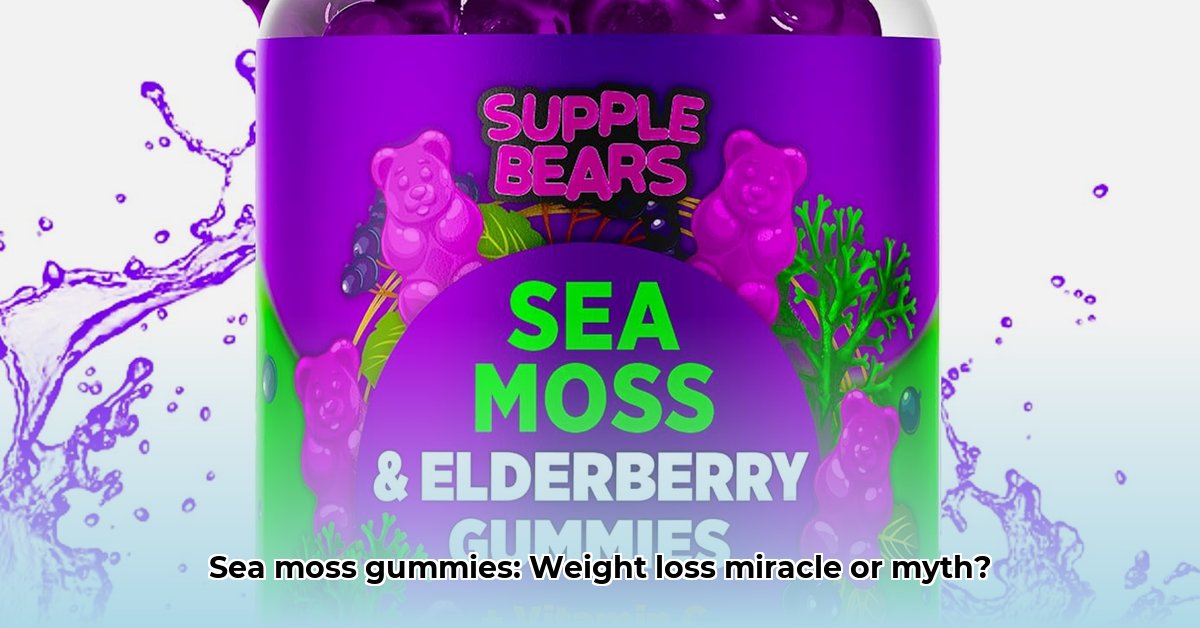
Sea Moss Gummies for Weight Loss: A Closer Look
Sea moss gummies have surged in popularity, promising weight loss and various health benefits. However, separating fact from fiction requires careful examination of the available evidence. This article objectively assesses the scientific basis for these claims, explores potential risks, and provides actionable steps for informed decision-making.
What Exactly Are Sea Moss Gummies?
Sea moss gummies are dietary supplements derived from Chondrus crispus, a type of red algae also known as Irish moss. They offer a convenient way to ingest potential health benefits associated with sea moss. It's crucial to understand, however, that the gummy manufacturing process may alter the nutrient profile compared to consuming raw sea moss. Processing often diminishes the nutritional value.
The Weight-Loss Claim: Truth or Fiction?
Currently, robust scientific evidence supporting sea moss gummies for weight loss is lacking. While many online sources promote this benefit, the evidence mainly consists of small-scale studies and anecdotal reports, insufficient to draw definitive conclusions. Sea moss contains fiber, which aids digestion and promotes satiety (feeling full), potentially contributing to weight management. However, much of this fiber might be lost during gummy production. Therefore, relying on sea moss gummies for significant weight loss is unreliable.
Potential Upsides (But Proceed with Caution)
Sea moss contains vitamins and minerals, and is rich in antioxidants, which may protect cells from damage. However, these benefits are not unique to sea moss; a balanced diet offers similar nutrients with reduced risk.
Potential Drawbacks: Serious Considerations
Several potential risks are associated with sea moss gummies:
- Iodine Overload: Sea moss has high iodine levels. Excessive iodine intake can cause thyroid problems, particularly for individuals with pre-existing thyroid conditions.
- Heavy Metal Contamination: Sea moss products may contain heavy metals, posing a significant health risk, especially in unregulated products.
- Lack of Regulation: The dietary supplement industry is less regulated than the pharmaceutical industry, leading to inconsistent product quality and purity.
- Allergic Reactions: Allergic reactions to sea moss are possible.
Making Smart Choices: Reducing Your Risks
To minimize risks associated with sea moss gummies:
- Prioritize Independent Lab Testing: Choose brands providing third-party lab results verifying purity and low heavy metal content. Don't solely rely on manufacturer claims.
- Monitor Iodine Intake: Check the iodine content and ensure it aligns with the recommended daily allowance. Avoid exceeding the safe limits.
- Consult Your Doctor: Consult your physician before using sea moss gummies, especially if you have a thyroid condition or take other medications.
- Start with a Low Dose: Begin with a small amount to monitor for adverse reactions.
- Be Skeptical of Exaggerated Claims: Avoid products making unrealistic promises.
The Bottom Line: Science Matters
The hype surrounding sea moss gummies and weight loss far exceeds concrete scientific evidence. While sea moss contains nutrients, its effectiveness for weight loss requires further research. A balanced diet, regular exercise, and professional guidance are more reliable approaches for weight management.
A Balanced View: Pros and Cons Summarized
| Potential Benefits | Potential Risks |
|---|---|
| Some vitamins and minerals | High iodine content; risk of iodine overdose |
| Antioxidants | Potential for heavy metal contamination |
| May act as a prebiotic (in raw, unprocessed form) | Allergic reactions possible |
| Convenient gummy format | Lack of regulation; inconsistent product quality and purity |
| Limited scientific evidence for weight loss claims |
Disclaimer: This information is for educational purposes only and is not a medical substitute for professional advice. Consult a healthcare professional before dietary changes or supplement use.
How to Choose Safe Sea Moss Gummies with Low Iodine and Heavy Metals
Key Takeaways:
- Limited scientific evidence supports sea moss gummies' benefits, especially weight loss.
- High iodine content poses a risk, especially for individuals with thyroid issues.
- Heavy metal contamination is a concern, varying across brands and sources.
- Choosing reputable brands with transparent testing practices is crucial.
Understanding the Hype: Sea Moss and Weight Loss
While many claim sea moss gummies promote weight loss, the scientific evidence is limited. While sea moss contains nutrients, their impact on human weight loss requires further investigation. Manage expectations; individual results vary significantly.
Iodine: A Double-Edged Sword
Sea moss's high iodine content is a double-edged sword. Iodine is essential, but excess iodine is harmful and can lead to hyperthyroidism (an overactive thyroid). Selecting products that specify iodine content within safe limits is crucial. Consult your doctor, especially with existing thyroid conditions.
Heavy Metals: A Hidden Danger
Sea moss's absorption of minerals from the environment includes heavy metals. Contamination varies; some sea moss is cleaner than others. Choose brands with third-party heavy metal testing and certifications.
Choosing Wisely: Steps to Safer Sea Moss
- Examine the Label: Check for clear indications of iodine content and heavy metal test results.
- Verify Third-Party Testing: Look for independent lab testing from accredited sources.
- Research Brand Reputation: Review consumer feedback and the brand's history.
- Consult Your Doctor: Discuss sea moss gummies with your doctor before use, especially with pre-existing health conditions or medication.
Pros and Cons of Sea Moss Gummies
| Pros | Cons |
|---|---|
| Convenient nutrient delivery | Potential for iodine overload |
| Potential prebiotic effects (raw form) | Risk of heavy metal contamination |
| Rich in vitamins and minerals | Limited scientific support for weight loss claims |
| Relatively palatable | High cost compared to other nutrient sources |